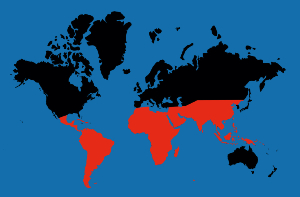Several months ago, a London-bound traveler from Ghana missed her flight from Kotoka International Airport in Accra not because she failed to show up at the airport on time but because she was unlucky enough to approach an immigration officer for help in locating the gate from where she was to board her plane. Asking an official or anyone else for such assistance is nothing out of the ordinary, except when you happen to be dealing with corrupt officials who seek to exploit any situation to their personal financial advantage, or who otherwise artificially create difficulties for people so they could extort bribe money from them posing as saviors.
Like their counterparts elsewhere around the world, immigration officers in Ghana are supposed to turn back travelers suspected of carrying questionable travel documents. Most of the time, however, suspicions about travelers who are turned back for this reason have proved to be completely groundless. The incident cited above is a good example. In this case, the traveler was not permitted to get on her flight ostensibly because the immigration officer from whom she had sought directions to her gate suspected her of traveling on a false passport. And what was the basis for the immigration officer's suspicion?
According to the traveler, the officer argued that, since her passport indicated that she had previously traveled through the airport, she should have been able to find the gate on her own, insinuating that her inability to do so meant that her passport might have been falsified. This harebrained argument implies that even a mere one-time passage through an airport (the traveler in question had used Kotoka only once before) should necessarily give a person perfect knowledge of the location of every installation or fixture in that particular airport complex. Not even airport employees can claim such familiarity with the airports where they work.
So the young lady -she was given the option of bribing her way through but she steadfastly refused -was prevented from leaving Ghana on schedule because immigration officers "suspected" her and decided to conduct an "investigation" into how she procured the documents with which she was traveling. Interestingly enough, the so- called investigation lasted for as long as it takes to drive from Kotoka airport to the British High Commission in Accra, where the poor traveler was dragged for verification of her visa to enter the UK. Consular officials at the High Commission promptly.
I confirmed that both her passport and her visa were genuine. The Ghanaian official in charge of the "investigation" only succeeded in making a complete fool of himself in the presence of British consular officers, who thought the whole exercise was totally unwarranted and a sheer waste of everybody's time, not to mention a waste of the Ghanaian taxpayers' money.
But while perfectly legitimate and law-abiding travelers, just to get them to pay bribes, are harassed and humiliated and prevented from getting on planes at Kotoka by immigration officers, criminal elements laden with drugs and other contrabands routinely make it through the immigration checkpoints at the same airport unimpeded. We know this because drug smugglers originating from Kotoka are frequently apprehended at European and US airports. The only way the criminals manage to ship both themselves and their toxic merchandise by air is through bribery of airport officials.
Inbound travelers also do encounter their fair share of problems with Kotoka' s corrupt officials, in their case mostly with customs officers. To get their luggage out, travelers, especially if they are carrying a lot of stuff, often must pay bribes. Those who refuse to "grease the palms" -the local terminology for bribery -of customs officers usually run the risk of being taxed out of their personal belongings and gifts. As with immigration, either you bribe your way through customs or you suffer the consequences for being a "wise guy."
Yet in discussing the issue of corruption, it would be unfair to single out immigration and customs officers at the airport for criticism. Corruption in Ghanaian society is very rampant. Like the hydra-headed evil that it is, corruption can be found everywhere: in the police stations, in the hospitals, in the government ministries, in the banks, in the palaces of local chiefs, in city halls, in the comer offices of supermarket and department store managers, even within the hallowed confines of academia. It's an epidemic of sorts, an epidemic that has plagued Ghana for as long as Ghana has been around as an independent nation. And it seems that this plague has a long course to run because the government isn't doing anything to curb it, and the general population largely appears resigned to it.
As for the governmental indifference, perhaps there is a good reason for it. It appears that when the government looks in the mirror -and this goes for all past Ghanaian regimes as well -what it probably sees is an image that bears an uncomfortably striking resemblance to the bribe-takers at Kotoka. The truth is that government can only take action against corruption if it is ethically up to par. Unfortunately, like a good man, or a good woman, such a government is hard to find anywhere on the African continent. Which partly explains why Africa has always been, and may continue to be, on the margins of human advancement. When public servants. both big and small become preoccupied with feathering their nests or serving their own selfish interests, the greater good of society inevitably suffers.















